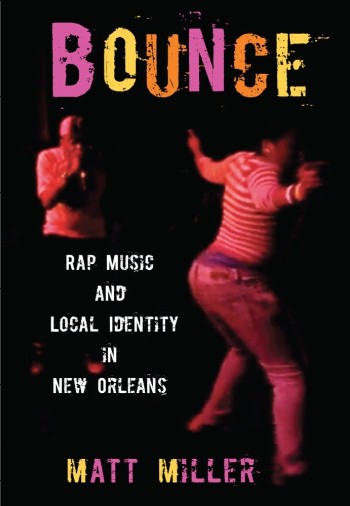Fuse Book Review: Too Square to “Bounce”
Instead of painting the vibrant and colorful scene that is New Orleans, author Matt Miller supplies dry exposition about each event via a blow-by-blow chronological time line.
Bounce: Rap Music and Local Identity in New Orleans by Matt Miller. University of Massachusetts Press, 232 pages, $24.95.
By Kathleen Burke.
The story of New Orleans Bounce music is rooted in a rich history of creativity, slavery, innovation, and cultural collaboration, punctuated by the nation’s most catastrophic natural disaster in recent memory. Spice this deep tradition with hot button issues—community, betrayal, murder, drugs, poverty, suicide, politics, homosexuality—and you have the makings of a half-dozen best-sellers. But Matt Miller’s Bounce: Rap Music and Local Identity in New Orleans turns out to be a nearly 200-page research paper, with little to no humor, character development, or authorial point of view. The sequence of events comes off as disjointed at times, and the prolific lists of names and album titles make it difficult for the reader to stay engaged. Bounce hasn’t got much narrative hop.
The first half of the book contains some fascinating history regarding the rise of New Orleans as a community and ultimately an American city, a focus on context that shows off Miller’s strengths as a fact-gatherer and organizer. The scholarly analysis of the music throughout the remainder of Bounce, while precise and deliberate, lumbers along with all the linguistic grace and rhythm found in a university seminar room. Considering the in-yer-face subject matter, Miller’s academic approach is a big mistake.
Instead of painting the vibrant and colorful scene that is New Orleans, author Matt Miller supplies dry exposition about each event via a blow-by-blow chronological time line. At times he manages to make even erotic and hilarious cultural quirks clinical and mundane. While discussing dance moves and outside block parties, Miller notes that “rappers often exhorted listeners at the collective or individual levels to dance, encouragement that was sometimes localized to particular parts of the body (‘Shake that ass like a saltshaker’).” This type of language strikes the reader as stuffy and wooden to the point of bewildering parody: the author, white coat clad and clipboard equipped, views a bunch of kids dancing in a project courtyard from a window above, peering down over his spectacles (perhaps, in a moment of abandon, tapping his foot) while taking copious notes.
This type of petrified verbiage permeates the work, most glaringly in moments such as the analysis of the lyrics in the quintessential Bounce track “Where Dey At” by MC T.T. Tucker. According to Miller, “The lyrics of ‘Where Dey At’ existed at a level of casual abstraction that accommodated a wide range of literal meanings as well as connoted moods or feeling, including electoral politics, social control, male sexual desire, the hustling lifestyle, the worthiness of the performer, and the city’s neighborhood culture.” After a quick internet search (the lyrics are not printed in the book), we find that Miller’s lofty, dare I say noble interpretation of lines such as “Fuck David Duke . . . Dog-ass ho better have my money . . . Let me hit it from the back cause I got a jimmy hat . . . Pussy-ass nigga better have my money . . . (I’m the) Nigga nigga nigga you love to hate . . . Boot boot boot boot boot up bitch” are, at very least, a colossal stretch. This is a song by a pimp/drug dealer trying to survive in one of the most poverty-stricken ghettos in the United States, not, as Miller argues, a deliberately executed social commentary.
But you have to hand Miller his mastery of research and literary notation. Unquestionably, hours of interviews, research, and cataloguing went are behind the creation of this work. There are 17 pages (!) of footnotes and an eight page index in a relatively short book. Miller is no doubt an admirable scholar; he currently teaches American studies at Emory University where he completed his PhD. But Bounce: Rap Music and Local Identity in New Orleans emerged from his dissertation without sufficient rethinking and it shows. Recreating the birth of New Orleans rap, bounce, and hip hop calls for a far more dramatic and colorful approach. Miller is passionate about the music, but in his book, he is too square to bounce very high.
Tagged: Bounce, Bounce: Rap Music and Local Identity in New Orleans, Matt Miller, New Orleans


